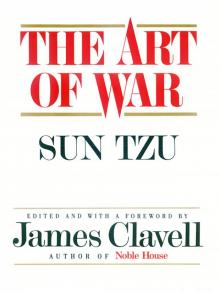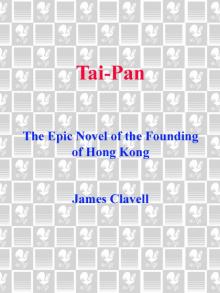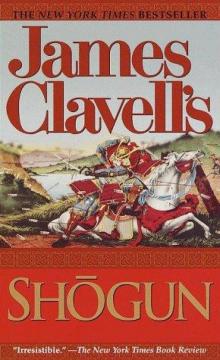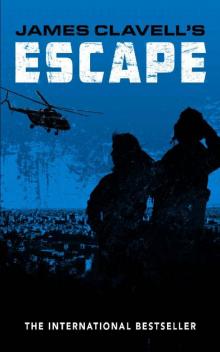- Home
- James Clavell
Whirlwind Page 56
Whirlwind Read online
Page 56
That’s what really counts, he thought, rereading the telex, safety—safety first and safety last. “Mac, would you send Liz a reply for me: ‘Leaving for Al Shargaz now and will phone on arrival.’ Telex Thurston and ask what deal he would offer if I double the number of X63s presently on order. S—”
“Eh?”
“Well, it costs nothing to ask; IH’s bound to hear about our problems here and I’m not going to let those buggers start giving us the finger—better to keep them off-balance. In any event we could use two X63s here to service all the Guerney contracts—if things were different. Finish the telex, see you soon.”
“Okay.”
Gavallan sat back in the easy chair and let his mind drift, collecting his strength. I’m going to have to be very strong. And very clever. This is the one that can bury me and S-G and give Linbar everything he needs—this and Iran together. Yes, and it was stupid to lose your temper like that. What you need is Kathy’s Shrieking Tree… Ah, Kathy, Kathy.
The Shrieking Tree was an old clan custom, a special tree chosen by the oldest of the clan, somewhere nearby, that you could go out to, alone, when the deevil—as old Granny Dunross, Kathy’s grandmother, called it—“when the deevil was upon you and there you could curse and rant and rave and curse some more until there were no more curses left. Then there would always be peace in the home and never a need to really curse a husband or wife or lover or child. Aye, just a wee tree, for a tree can bear all the curses even the deevil himself invented.”
The first time he had used Kathy’s Shrieking Tree was in Hong Kong. There it was a jacaranda in the garden of the Great House, the residence of the taipan of Struan’s. Kathy’s brother, Ian, was taipan then. Gavallan knew the date exactly: it was Wednesday, August 21, 1963, the night she told him.
Poor Kathy, my Kathy, he thought, loving her still—Kathy, born under an ill-set star. Swept off your feet by one of the Few—John Selkirk, flight lieutenant, DFC, RAF—married at once, not yet eighteen, widowed at once, not yet three months older, him torched out of the skies and vanished. Rotten war years and more tragedy, two beloved brothers killed in action—one your twin. Meeting you in Hong Kong in ’46, at once in love with you, hoping with all my heart that I could make up for some of the unluck. I know Melinda and Scot did—they’ve turned out wonderfully, so grand. And then, in ’63, before your thirty-eighth birthday, the multiple sclerosis.
Going home to Scotland as you’d always wanted—me to put Ian’s plans into effect, you to regain your health. But that part not to be. Watching you die. Watching the sweet smile you used to cover the hell inside, so brave and gentle and wise and loving, but going, plateau by plateau. So slowly, yet so fast, so inexorably. By ’68 in a wheelchair, mind still crystal, voice clear, the rest a shell, out of control and shaking. Then it was ’70.
That Christmas they were at Castle Avisyard. And on the second day of the new year when the others had gone and Melinda and Scot were skiing in Switzerland, she had said, “Andy, my darling, I cannot endure another year, another month, or another day.”
“Yes,” he said simply.
“Sorry, but I’ll need help. I need to go and I… I’m ever so sorry that it’s been so long…but I need to go now, Andy. I have to do it myself but I’ll need help. Yes?”
“Yes, my darling.”
They had spent a day and a night talking, talking about good things and good times and what he should do for Melinda and Scot, and that she wanted him to marry again, and she told him how wonderful life had been with him and they laughed, one with another, and his tears did not spill till later. He held her palsied hand with the sleeping pills and held her shaking head against his chest, helped her with the glass of water—a little whisky in it for luck—and never let her go until the shaking had stopped.
The doctor had said kindly, “I don’t blame her—if I’d been her I would have done it years ago, poor lady.”
Going then to the Shrieking Tree. But shrieking no words, nothing—only tears.
“Andy?”
“Yes, Kathy?”
Gavallan looked up and he saw it was Genny, McIver by the door, both of them watching him. “Oh, hello, Genny, sorry, I was a million miles away.” He got up. “It—I think it was the Avisyard that set me thinking,”
Genny’s eyes widened. “Oh, an Avisyard telex? Not a bird down?”
“No, no, thank God, just Imperial Helicopters up to their old tricks.”
“Oh, thank God too,” Genny said, openly relieved. She was dressed in a heavy coat and a nice hat. Her large suitcase was in the outer office where Nogger Lane and Charlie Pettikin waited. “Well, Andy,” she said, “unless you override Mr. McIver, I suppose we should go. I’m as ready as I’ll ever be.”
“Come on, Gen, there’s no n—” McIver stopped as she imperiously held up her hand.
“Andy,” she said sweetly, “please tell Mr. McIver that battle is joined.”
“Gen! Will y—”
“Joined, by God!” Imperiously she waved Nogger Lane away from her suitcase, picked it up, staggered a little under its weight, and swept out with an even more imperious, “I can carry my own suitcase, thank you very much.”
There was a big hole in the air behind her. McIver sighed. Nogger Lane had a hard time keeping the laughter off his face. Gavallan and Charlie Pettikin thought it best to be noncommittal.
“Well, er, no need for you to drive out with us, Charlie,” Gavallan said gruffly.
“I’d still like to, if it’s all right,” Pettikin said, not really wanting to but McIver had asked him privately for support with Genny. “That’s a cute hat, Genny,” he had told her just after a delightful breakfast with Paula. Genny had smiled sweetly. “Don’t you try to butter me up, Charlie Pettikin, or I’ll give you what for too. I’ve had men generally—in fact I’m very pissed off indeed…”
Gavallan put on his parka. He picked up the telex and stuck it into his pocket. “Actually, Charlie,” he said and some of his concern showed now, “if you don’t mind I’d rather you didn’t—I’ve got some unfinished stuff to chat with Mac about.”
“Sure, of course.” Pettikin stuck out his hand and hid the beam. Not going out to the airport would give him a few bonus hours alone with Paula. Paula the Fair, he had thought of her since breakfast even though she was brunette. To McIver he said, “I’ll see you at home.”
“Why not wait here—I want to raise all the bases as soon as it’s dark and we can go back together. I’d like you to hold the fort. Nogger, you can quit.” Nogger Lane beamed and Pettikin cursed silently.
In the car McIver drove, Gavallan was beside him, Genny in the back. “Mac, let’s talk about Iran.”
They went through their options. Each time they came back to the same gloomy conclusion: they had to hope the situation came back to normal, the banks reopened, they got the money owing to them, that their joint venture was exempt and they weren’t nailed. “You just have to keep going, Mac. While we can operate, you’ll have to continue, whatever the problems.”
McIver was equally grave. “I know. But how do I operate without money—and what about the lease payments?”
“Somehow I’ll get you operating money. I’ll bring cash from London in a week. I can carry the lease payment on your aircraft and spares for another few months; I may even be able to do the same with the X63s if I can reschedule payments but, well, I hadn’t planned on losing so many contracts to IH—maybe I can get some of them back. Whichever way, it’ll be dicey for a while but not to worry. Hope to God Johnny gets in; just have to get home now, there’s so much to do…”
McIver narrowly avoided a head-on collision with a car that charged out of a side street, almost went into the joub, and came back onto the roadway again. “Bloody twit! You all right, Gen?” He glanced into the rearview window and winced, seeing her stony face.
Gavallan felt the icy blast too, started to say something to her but thought better of it. Wonder if I could get hold of Ian—perhaps he could g
uide me out of the abyss—and, thinking of that, reminded him of David MacStruan’s tragic death. So many of them, the Struans, MacStruans, Dunrosses, their enemies the Gornts, Rothwells, Brocks of ancient days, had died violent deaths or vanished—lost at sea—or died in strange accidents. So far Ian’s survived. But how much longer? Not many more times. “I think I’m up to my eighth, Andy,” Dunross had said the last time they met.
“What now?”
“Nothing much. Car bomb went off in Beirut just after I’d passed by. Nothing to worry about, I’ve said it before, there’s no pattern. I just happen to have a charmed life.”
“Like Macao?”
Dunross was an enthusiastic racer and had driven in many of the Macao Grand Prix. In ’65—the race still amateur then—he had won the race but the right front tire of his E Type blew out at the winning post and shoved him into the barricade and sent him tumbling down the track, other cars taking evading action, one careening into him. They had cut him out of the wreckage, everything intact, unhurt but for his left foot missing.
“Like Macao, Andy,” Dunross had said with his strange smile. “Just an accident. Both times.” The other time his engine had exploded but he had been unscathed. Whispers had it that his engine had been tampered with—the finger pointed at his enemy Quillan Gornt, but not publicly.
Quillan’s dead and Ian’s alive, Gavallan thought. So am I. So’s Linbar; that bastard will go on forever… Christ Almighty, I’m getting morbid and stupid—got to stop it. Mac’s worried enough as it is. Got to figure a way out of the vise. “In an emergency, Mac, I’ll send messages through Talbot, you do the same. I’ll be back in a few days without fail and by then I’ll have answers—meanwhile I’ll base the 125 until further notice—Johnny can be a courier for us. That’s the best I can do for today…”
Genny, who had not uttered a word and had politely refused to be drawn into the conversation though she listened attentively, was also more than a little worried. It’s obvious there’s no future for us here, and I’d be quite very glad to leave—provided Duncan comes too. Even so, we can’t just meekly run away with our tails between our legs and let all of Duncan’s work and life’s nest egg be stolen, that’d kill him as certainly as any bullet. Ugh! I do wish he’d do what he’s told—he should have retired last year when the Shah was still in power. Men! Bloody stupid, the whole lot of them! Christ Almighty! What fools men are!
Traffic was very slow now. Twice they had to divert because of barricades erected across the roads—both of them guarded by armed men, not Green Bands, who angrily waved them away. Bodies here and there among the piled refuse, burned-out cars and one tank. Dogs scavenging. Once there was sudden firing nearby and they took a side street, avoiding a pitched battle between what factions they never found out. A stray bazooka shell plastered a nearby building but without danger to them. McIver eased his way around the burned hulk of a bus, more than ever glad that he had insisted that Genny evacuate Iran. Again he glanced at her in the rearview mirror and saw the white face under the hat and his heart went out to her. She’s damn good, he thought proudly, so much guts. Damn good, but so bloody-minded. Hate that bloody hat. Hats don’t suit her. Why the hell won’t she do what she’s told without arguing? Poor old Gen, I’ll be so relieved when she’s not in danger.
Near the airport, traffic almost came to a standstill, hundreds of cars crammed with people, many Europeans, men, women, and children, going there on the rumor that the airport had been reopened—enraged Green Bands turning everyone away, crude signs scrawled in Farsi and misspelled English nailed to trees and to walls: AIRPRT FORBIDUN NOW. AIRPRT OPEN MUNDAY—IF TICKUT AND EXIT PURMIT.
It took them half an hour to talk their way through the barrier. It was Genny who finally managed it. Like most of the wives who had to shop and to deal with servants and day-to-day living, she could speak some Farsi—and though she had not said a word all the way, she leaned forward and spoke to the Green Bands pleasantly. At once they were waved through.
“My God, Gen, that was wonderful,” McIver said. “What did you tell that bastard?”
“Andy,” she said smugly, “please tell Mr. McIver I told them he was a suspected smallpox carrier who was being sent out of the country.”
More Green Bands were on the gate that led to the freighting area and their office, but this time it was easier and clearly they were expected. The 125 was already on the runway, surrounded by armed Green Bands and trucks. Two motorcycle Green Bands motioned them to follow and roared off onto the tarmac, leading the way.
“Why are you late?” the mullah Tehrani said irritably, coming down the 125’s steps, two armed revs following. Both Gavallan and McIver noticed he was wearing new glasses. They caught a glimpse of John Hogg inside the cabin, one of the revs at the head of the steps with a leveled submachine gun. “The aircraft must take off instantly. Why are you late?”
“So sorry, Excellency, the traffic—Insha’Allah! So sorry,” McIver said carefully. “I understand from Captain Lane your work for the Ayatollah, may he live forever, was satisfactory?”
“There was not enough time to complete all my work. As God wants. It is, er, it is necessary to go tomorrow. You will arrange it please. For 9:00 A.M.”
“With pleasure. Here is the passenger crew manifest.” McIver gave him the paper. Gavallan, Genny, and Armstrong were on if, Armstrong as going on leave.
Tehrani read the paper easily now, openly ecstatic with his glasses. “Where is this Armstrong?”
“Oh, I presumed he was aboard.”
“There’s no one aboard but the crew,” the mullah said irritably, the vast pleasure of being able to see overcoming his nervousness at having allowed the 125 to land. But he was glad he had, the glasses were a gift of God and the second pair promised by the pilot next week a protection against breakage and the third pair just for reading… Oh, God is Great. God is Great, all thanks to God for putting the thought into the pilot’s head and for letting me see so well. “The aircraft must leave at once.”
“It’s not like Mr. Armstrong to be late, Excellency,” Gavallan said with a frown. Neither he nor McIver had heard from him since yesterday—nor had he come to the flat last night. This morning Talbot had shrugged, saying that Armstrong had been delayed, but not to worry, he would be at the airport on time. “Perhaps he’s waiting in the office,” Gavallan said.
“There is no one there who should not be there. The aircraft will leave now. It will not wait. Aboard, please! The aircraft will leave now.”
“Perfect,” Gavallan said. “As God wants. By the way we’d like clearance for the 125 to come back Saturday and clearance for a 206 to go to Tabriz tomorrow.” With great formality he handed him the papers, neatly filled out.
“The, er, the 125 may return but no flights to Tabriz. Perhaps Saturday.”
“But, Excellency, don’t y—”
“No,” the mullah said, conscious of the others watching him. He ordered the truck blocking the runway out of the way and looked at Genny as she got out of the car and nodded approvingly. Gavallan and McIver were surprised to notice that now she had tucked her hair into the scarf part of her hat so none of her hair was showing and, with her long coat, almost gave the impression of being in chador. “Please to get aboard.”
“Thank you, Excellency,” she said in adequate Farsi that she had been rehearsing with the help of a dictionary all morning, with the necessary perfect amount of seriousness, “but with your permission I will stay. My husband is not as healthy in the head as he should be, temporarily, but you—being a man of such intelligence—you would understand that though a wife cannot go against her husband’s wishes, it is written that even the Prophet himself had to be looked after.”
“True, true,” the mullah said and looked at McIver thoughtfully. McIver stared back perplexed, without understanding. “Stay if you wish.”
“Thank you,” Genny said, with great deference. “Then I stay. Thank you, Excellency, for your agreement and your wisdom.�
�� She hid her glee at her cleverness and said in English, “Duncan, the mullah Tehrani agrees I should stay.” She saw his eyes cross and added hastily, “I’ll wait in the car.”
He was there before her. “You bloody get aboard that kite,” he said, “or I’ll bloody put you aboard.”
“Don’t be silly, Duncan, dear!” She was so solicitous. “And don’t shout, it’s so bad for your bloody pressure.” She saw Gavallan coming over and some of her confidence vanished. Around her was rotten snow and rotten sky and sour youths gaping at her. “You know I really do love this place,” she said brightly, “how could I leave?”
“You—you’re bloody leaving an—” McIver was so angry he could hardly talk and for a second Genny was afraid she had gone too far.
“I’ll leave if you leave, Duncan. Right now. I’m not repeat not going without you and if you try to force me I’ll throw such a tantrum that it’ll blow the 125 and the whole airport to kingdom come! Andy, explain to this—this person! Oh, I know you can both drag me aboard but if you do you’ll both lose total face and I know you both too well! Andy!”
Gavallan laughed. “Mac, you’ve had it!”
In spite of his rage, McIver laughed too, and the mullah watching and listening shook his head with disbelief at the antics of Infidels.
“Gen, you…you’ve been planning this all along,” McIver sputtered.
“Who me?” She was all innocence. “Perish the thought!”
“All right, Gen,” McIver said, his jaw still jutting, “all right, you win, but you haven’t just lost face, you’ve lost tail as well.”
“Aboard!” the mullah said.
“What about Armstrong?” McIver said.
“He knows the rules and the time.” Gavallan gave Genny a hug and shook hands with McIver. “See you soon and take care.” He went aboard, the jet took off, and during the long drive back to the office neither Genny nor Duncan McIver noticed the time passing. Both were preoccupied. Genny sat in the front. She was very tired but very satisfied. “You’re a good woman, Gen,” he had said the moment that they were alone, “but you’re not forgiven.”

 Gai-Jin
Gai-Jin The Art of War
The Art of War Tai-Pan
Tai-Pan Noble House
Noble House Shōgun
Shōgun Whirlwind
Whirlwind Escape
Escape King Rat
King Rat The Children's Story
The Children's Story